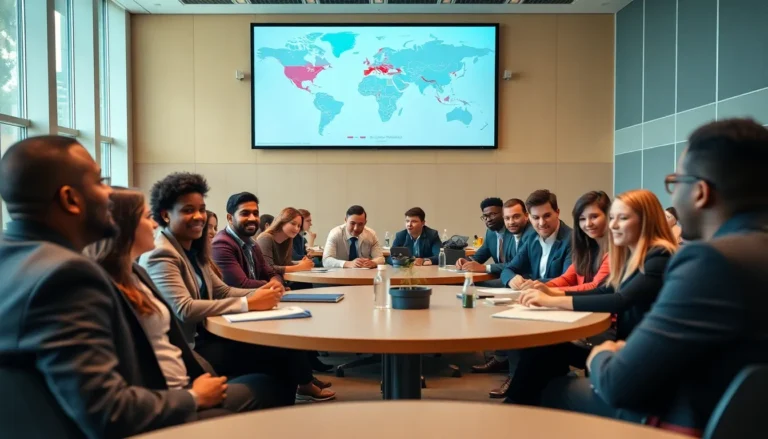Table of Contents
ToggleIn a world that seems to change faster than a cat video goes viral, a global affairs degree might just be the secret weapon you didn’t know you needed. Imagine diving into the intricate web of international relations, politics, and cultures while impressing friends with your newfound knowledge of global diplomacy. Who knew that understanding trade agreements could be this cool?
With a global affairs degree, they won’t just be reading the news; they’ll be shaping it. This degree opens doors to careers that can influence everything from humanitarian efforts to global security. So, if they’re ready to tackle the world’s biggest challenges while having a good laugh along the way, it’s time to explore what a global affairs degree has to offer. After all, who wouldn’t want to be the person at parties who can explain why countries are like teenagers—full of drama and unpredictability?
Overview of Global Affairs Degree
A global affairs degree focuses on the complexities of international relations, diplomacy, and cross-cultural interactions. Programs typically cover topics such as global security, human rights, and international trade, giving students a comprehensive understanding of world dynamics. Graduates often engage with critical global issues, equipping them to contribute meaningfully in various sectors.
Courses in this degree help students analyze how political, social, and economic factors shape global interactions. Students might learn about international organizations, conflict resolution strategies, and the role of non-governmental organizations in humanitarian efforts. This academic framework fosters critical thinking, enabling graduates to approach real-world challenges systematically.
Pursuing a global affairs degree often opens doors to diverse career opportunities. Graduates can work in government agencies, international organizations, or private sector companies focused on international business. Additionally, many access roles in journalism, diplomacy, or non-profits.
Internship opportunities frequently accompany these degree programs, providing real-world experience. Students may engage with organizations focused on global issues or participate in study abroad programs that enhance their cultural awareness. Networking with professionals in the field becomes essential for building a career in global affairs.
This degree supports individuals aiming to become informed citizens capable of engaging in meaningful discussions about global issues. As global interconnectivity increases, the skills gained from a global affairs education become increasingly valuable.
Benefits of Pursuing a Global Affairs Degree
A global affairs degree offers numerous advantages for individuals looking to understand international dynamics. This education prepares graduates to navigate complex global issues effectively.
Career Opportunities
Career opportunities abound for graduates with a global affairs degree. Fields such as government, international organizations, and the private sector actively seek individuals with this expertise. Many pursue positions in diplomacy or work for non-profits that focus on humanitarian aid. Some graduates find roles in journalism, reporting on international events and policies. Those with strong analytical skills often join think tanks or research institutions. Opportunities for internships and study abroad experiences further enhance employability, providing essential networking prospects.
Personal Growth
Personal growth stems from the diverse learning experiences encountered during a global affairs program. Critical thinking skills sharpen as students tackle real-world problems. Engaging with various cultures fosters empathy and broadens perspectives on global issues. Collaborative projects encourage teamwork and communication, both crucial in today’s interconnected world. Through debates and discussions, individuals refine their opinions and become confident in addressing complex subjects. A deeper understanding of international relations leads to lifelong learning and informed citizenship, promoting active participation in global conversations.
Curriculum and Key Subjects
Global affairs degree programs offer a robust curriculum designed to equip students with essential knowledge and skills in international relations and global dynamics. Core courses form the backbone of this education, focusing on critical themes in global politics and socio-economic interactions.
Core Courses
Core courses typically include subjects such as international relations theory, comparative politics, and global security. Students explore global governance mechanisms and study key historical events that shape current international policies. Additionally, coursework in human rights highlights the importance of ethical considerations in global interactions. Analyzing political systems across various cultures enhances understanding of global complexities. Courses in research methods build foundational skills required for effective analysis and evaluation of international issues.
Elective Options
Elective options allow students to tailor their education according to specific interests. Courses may cover areas such as international law, environmental policy, and economic development. Topics like cultural diplomacy and public health emphasize the interplay between different sectors in global affairs. Students often choose electives that incorporate case studies, promoting real-world applications of theoretical concepts. Electives also include opportunities for fieldwork and internships, enriching overall educational experiences and enhancing job readiness. This flexibility enables graduates to pursue diverse career paths across multiple sectors.
Admission Requirements
Admission requirements for a global affairs degree vary by institution but generally include a mix of educational qualifications and application components. Applicants typically need to hold a high school diploma or equivalent and may need to present relevant coursework in social studies or political science.
Educational Background
Strong educational foundations enhance an applicant’s chances. Most programs require a high school GPA of at least 2.5, though competitive programs may expect higher standards. Additional consideration goes to candidates with advanced classes in history, economics, or foreign languages. Certain institutions might also prefer candidates who have engaged in extracurricular activities related to global issues, such as Model United Nations or debate teams. Prior experience in relevant volunteer positions can further strengthen an application.
Application Process
Navigating the application process requires attention to detail. Applicants usually must complete an online application form, which may include personal statements reflecting interest in global affairs. Transcripts from prior educational institutions need to accompany the application. Many programs also request letters of recommendation, ideally from instructors or employers familiar with the applicant’s academic potential. Some institutions might conduct interviews as part of the selection process, providing candidates a chance to showcase passion for international relations. Meeting application deadlines ensures applicants remain in the running for desired programs.
A global affairs degree opens doors to a world of opportunities. It equips graduates with the skills and knowledge needed to navigate complex international landscapes. This education fosters critical thinking and empathy while encouraging active engagement in global issues.
As the world becomes increasingly interconnected, the importance of understanding global dynamics cannot be overstated. Graduates are well-prepared to contribute meaningfully across various sectors, whether in government, non-profits, or private organizations.
Pursuing a global affairs degree not only enhances career prospects but also enriches personal growth. It empowers individuals to become informed citizens capable of participating in vital conversations about the future of our world.





